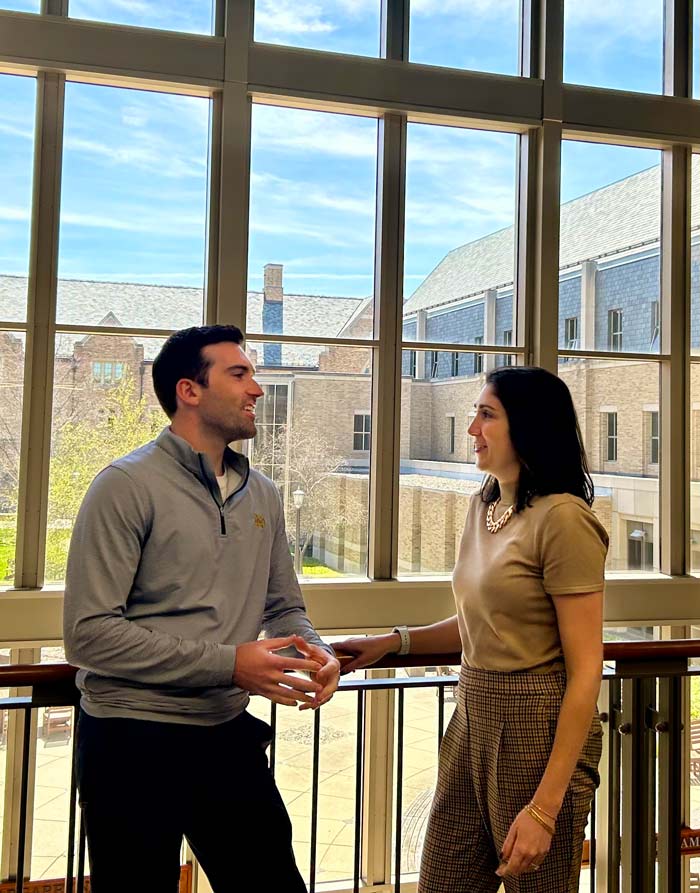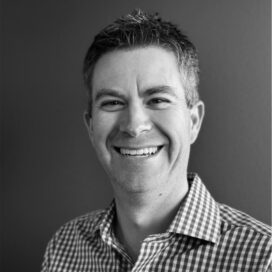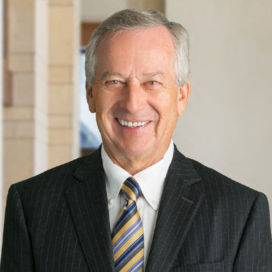Sustainable Careers
A decade out, siblings make an impact in sustainable business
Published: August 5, 2024 / Author: Lindsay Paturalski
Brother and sister duo Adam Conrath (BBA ’17) and Kirsten Conrath Higgins (BBA ’14) never planned on becoming experts in the renewable energy sector. As students in the University of Notre Dame’s Mendoza College of Business, they both majored in information technology management. But the critical role of data management combined with their energy studies minor sparked a passion that would, in time, become careers in this fast-growing and vital sector of business.
Conrath and Higgins spoke to students this spring in Climate, Economics, and Business Ethics, an integration course for Notre Dame undergraduates co-taught by Jessica McManus Warnell, a teaching professor of Management & Organization at Mendoza, and Eva Dziadula, a teaching professor in Notre Dame’s Department of Economics.
The siblings encouraged students with their optimism, noting that the world is at an inflection point with sustainability and that early career professionals with experience in this area have increasing opportunity to contribute.

Adam Conrath (ND ’17) and Kirsten Higgins (ND ’14)
They credit their information technology management majors for equipping them to assess and understand data in meaningful ways. “Data validation, anomaly detection and fitting into a company’s existing architecture is critical in what we do,” Conrath notes. Data management skills are critical as the focus on measuring and reporting business environmental impacts soars globally.
Both graduates compare their chosen industry to the digital transformation of the past decade: For now, knowledge of sustainability and green energy can set you apart, but in a few years, it will be a vital field regardless of the type of business.
Higgins started out in the traditional energy sector, spending seven years at BP before making the leap to the renewable natural gas sector. She is currently the vice president of renewable natural gas for Anew Climate, a global leader of diverse technological and nature-based solutions for low carbon fuel, renewable energy and emissions markets.
She credits the minor in energy studies with broadening her perspective, from the history of coal in Appalachia to how nuclear power works to why Notre Dame spends so much energy on vending machines. “Energy involves a little bit of everything,” said Higgins. “It complements any field of study. We’ve seen that in our careers now, especially with environmental sustainability. It’s at every level of every company.”
Just as Higgins appreciates the myriad windows into different fields and businesses she gained in her minor, she advocates for a career path that is forward looking with sustainable steps toward the goal of working in the renewable energy space. She encourages professionals wanting to work in sustainable business to maximize their current position and start learning the things they can do now to prepare for that next position.
Adam Conrath took a different route than the incremental method of his sister. “I don’t want to sound scary,” he said, pausing. “But take the leap of faith. Take a leap of faith into a new market. Because with a new market comes new opportunities.”
Conrath is the enterprise account executive at Persefoni, a young firm that specializes in helping companies measure and manage their carbon footprint across their operations and supply chain.
A company seeking to understand their carbon footprint would engage Persefoni to organize, calculate and analyze its data to gain a full picture of the operations and the impact on the climate footprint or “footprint hotspots.”
“The emerging renewable energy sector can offer both personal and professional rewards,” Conrath noted.
Like his sister, Conrath found career signposts in his energy studies minor. “The Paris Climate Agreement was adopted when I was at Notre Dame,” he said. “I wrote a paper on the agreement as an undergraduate, and it has been so interesting to see how regulations have adapted and how companies are aligning to those standards today. That’s my job today.”
Two different experiences. Two different approaches. But both siblings have ended up as young professionals in highly related fields in ways they never expected.
“My team comes in first to tell you what your carbon footprint is, then hers would come in and provide solutions to reduce it,” said Conrath.
The siblings mutual interest in sustainability has helped them as they navigate being parts of smaller, newer companies in an emerging market. Their excitement about being part of this nascent industry stems in part from the ability to make a tangible impact, since often uncharted waters offer the opportunity for early career professionals to “help write the playbook.”
They acknowledge some degree of political backlash to sustainable energy. But as professionals in the field, they don’t focus on the politics but on the potential.
“If there are reactions,” Higgins said, “You’re hitting a chord.”
“And if you’re hitting a chord,” Conrath followed up, “then there’s a paradigm shift coming.”
Related Stories




